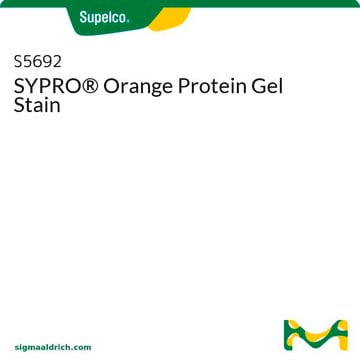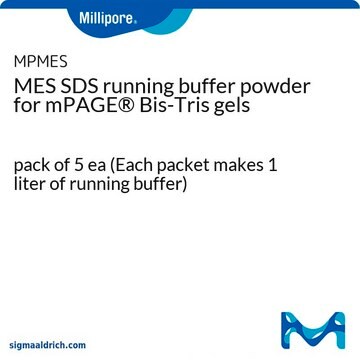S4942
SYPRO® Ruby Protein Gel Stain
Synonym(s):
SYPRO® dye, protein gel stain
About This Item
Recommended Products
shelf life
≥6 mo. (when stored at room temperature and protected from light)
Quality Level
technique(s)
protein staining: suitable
fluorescence
λex 280,450 nm; λem 610 nm
General description
- uses a simple staining protocol, with no possibility of overstaining
- delivers a linear quantitation range of over three orders of magnitude
- shows less protein-to-protein variability
- stains glycoproteins, lipoproteins, calcium-binding proteins, fibrillar proteins, and other difficult-to-stain proteins
- will not stain extraneous nucleic acids
- does not interfere with subsequent analysis of proteins by Edman-based sequencing or mass spectrometry
Application
Caution
Legal Information
Storage Class
10 - Combustible liquids
wgk_germany
WGK 3
flash_point_f
Not applicable
flash_point_c
Not applicable
ppe
Eyeshields, Gloves, multi-purpose combination respirator cartridge (US)
Certificates of Analysis (COA)
Search for Certificates of Analysis (COA) by entering the products Lot/Batch Number. Lot and Batch Numbers can be found on a product’s label following the words ‘Lot’ or ‘Batch’.
Already Own This Product?
Find documentation for the products that you have recently purchased in the Document Library.
Articles
Sigma offers EZBlue™ and ProteoSilver™ reagents for protein visualization, suitable for proteomics and traditional PAGE formats.
Identify causes and remedies for SDS-PAGE sample preparation challenges and optimize electrophoresis conditions.
Protocols
Protocol for sample preparation for cell lysis and efficient protein extraction from cultured tissues and cells for subsequent Western blotting.
Our team of scientists has experience in all areas of research including Life Science, Material Science, Chemical Synthesis, Chromatography, Analytical and many others.
Contact Technical Service







